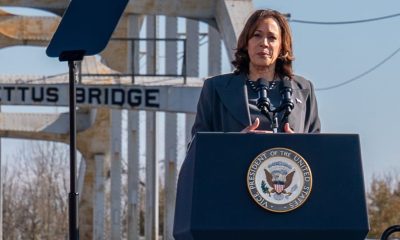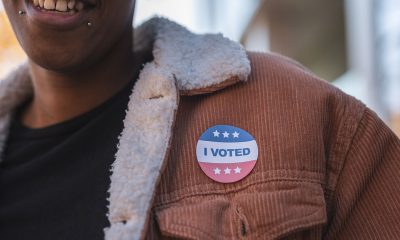Politics
Blacks Still Underrepresented at All Levels of Politics

Joint Center for Political and Economic Studies President Spencer Overton says there is a heated debate over how much progress we have made over the past 50 years. (Courtesy Photo)
By George E. Curry
NNPA Editor-in-Chief
WASHINGTON (NNPA) – Although Blacks have made tremendous improvement in holding elected office since passage of the 1965 Voting Rights Act, they remain underrepresented at the federal, state and local levels, according to a report scheduled to be released Tuesday by the Joint Center for Political and Economic Studies.
“Based on the most recent data, African Americans are 12.5% of the citizen voting age population, but they make up a smaller share of the U.S. House (10%), state legislatures (8.5%), city councils (5.7%), and the U.S. Senate (2%),” the report said.
The 38-page report titled, “50 Years of The Voting Rights Act: The State of Race in Politics,” was produced for the center by four prominent political scientists: Khalilah Brown-Dean, Zoltan Hajnal, Christina Rivers and Ismail White.
Joint Center President Spencer Overton said in a message introducing the report, that there is a heated debate over: How much progress have we made since 1965? How much more work is there to do?
He said, “These are contested questions, subject to ideology and opinion. A study published in Perspectives on Psychological Science, for example, shows that on average whites and African Americans differ on the amount of racial progress we have made, with whites now believing anti-white bias is more prevalent than anti-black bias. We have elected an African American president, but studies have shown that some government officials are less likely to respond to inquiries from citizens with seemingly black or Latino names. The questions are also at the core of many ongoing debates about voting rights in the U.S. Supreme Court and Congress, as well as in many states, counties, and municipalities.”
What is not contested is that the Voting Rights Act of 1965 changed the political landscape for African Americans, with the number of Black elected officials leaping from fewer than 1,000 in 1965 to now more than 10,000.
The change was particularly dramatic in the South, where 55 percent of African Americans live.
“Since the 1870s, white elected officials in many parts of the South had used violence, literacy tests, interpretation tests, poll taxes, and other devices to exclude African Americans,” the report recounted. “The Justice Department filed 71 voting rights lawsuits in the Deep South before 1965, but cases were typically complex, time-consuming, and expensive. When a court struck down one type of discriminatory device, local officials simply erected a different device that effectively excluded most African Americans.”
Selma, Ala. and surrounding Dallas County was typical. Deploying rigged tests about the U.S. Constitution and a requirement that voters be in “good character,” as defined by White registrars, a White minority was able to suppress the Black majority.
In 1965, more than half of Dallas County was Black. Of the county’s 15,000 voting-age Blacks, only 156 were registered to vote. By contrast, two-thirds of voting-age Whites were registered in the county. Throughout Alabama, only 19.4 percent of African Americans were registered. In neighboring Mississippi, just 6.4 percent of Blacks were registered.
As part of a massive voter registration campaign in 1965, the Southern Christian Leadership Conference (SCLC), the Student Nonviolent Coordinating Committee (SNCC) and local residents launched a Selma-to-Montgomery March to dramatize the lack of access to the ballot box.
On April 7, in what became known as “Bloody Sunday,” peaceful marchers in Selma were savagely beaten by Alabama State Troopers and local policemen as they attempted to walk across the Edmund Pettus Bridge to begin the 54-mile journey to Montgomery, the state capital.
The merciless beating of children, the elderly and adults was beamed in homes throughout the nation and provided the momentum for President Lyndon B. Johnson to sign the Voting Rights Act into law four months later.
“Only in the wake of the Voting Rights Act did black voter registration in the South begin to approach that of whites. Five years after the passage of the Act, the racial gap in voter registration in the former Confederate states had closed to single digits. By the start of the 1970s, the black/white registration gap across the Southern states was little more than 8 percentage points,” the report stated.
“In Louisiana, the gap between black and white voter registration rates decreased by nearly 30 percentage points from 1960 to the end of 1970s, and it continued to decrease over the next three decades. By 2010, black registration rates in the state of Louisiana and many of the other former Confederate states had exceeded white registration rates for the first time since Reconstruction. The Voting Rights Act had delivered a Second Reconstruction.”
In fact, in four of the 12 presidential elections since 1965, Black Southerners turned out at the polls at a higher rate than their White counterparts. Nationally, Black turnout exceeded White turnout in the 2012 presidential election and possibly in 2008, according to the report.
Activists credit much of that progress to the Voting Rights Act requirement that jurisdictions that previously discriminated against Blacks had to pre-clear voting changes in advance with federal authorities.
However, the Supreme Court’s decision in Shelby took away that tool and there is a measure pending in Congress that would reverse some of the damage. A House bill sponsored by “Bloody Sunday” veteran John Lewis (D-Ga.) and Jim Sensenbrenner (R-Wisconsin) would update the act.
“The proposed legislation would apply preclearance to jurisdictions with a record of voting rights violations within the previous 15 years, would make it easier for courts to block discriminatory rules before they are used in elections and harm voters, and would require disclosure of voting changes nationwide,” the report stated.
Efforts to expand the Black vote is also under attack in others quarters as well. The Joint Center report cited moves to purge voters, requiring proof of citizenship, requiring voter ID, felony disenfranchisement and restricting voting registration drives.
The report also addressed the elephant in the room – race.
“In urban local elections, race is a more decisive factor than income, education …religion, sexuality, age, gender, and political ideology. The 38-point racial gap exceeds even the 33 point gap between Democratic and Republican voters,” the study said.
According to the report, African Americans “were the least advantaged group in America in terms of policy outcomes.”
Not all of the problems were external. The issue of low Black voter turnout, especially in local elections, is a major challenge that warrants further study, the report said.
It noted, “ …In 2014, when there was great unrest over a police officer’s killing of Michael Brown, African Americans made up 67% of residents of Ferguson, Missouri. In 2012, a solid 100% of Ferguson precincts went for President Obama, but during Ferguson’s municipal off-cycle elections voters selected Ferguson’s Republican mayor and six city council members, all of whom except one were white.”
The report shatters the notion that we’re living in a post-racial society.
“Despite discussions about the declining significance of race, over the past few decades, racial divides along partisan lines have actually grown. African Americans have increasingly favored Democrats, and recently Latinos and Asian Americans have become more loyal to the Democratic Party as well. The shift to the left has been particularly pronounced for Asian Americans,” it said.
“On the other side, whites have moved slowly and unevenly – but inexorably – to the Republican Party. Fifty years ago, the Democratic Party dominated the white vote. Today, nationwide, whites are more apt to favor the Republican Party.”
It concluded, “Division is a normal and healthy part of democracy, but when a core dividing line in a nation becomes so closely aligned with race and ethnicity, larger concerns about inequality, conflict, and discrimination emerge.”
###
Activism
U.S. House Minority Leader Hakeem Jeffries and Rep. Lateefah Simon to Speak at Elihu Harris Lecture Series
The popular lecture series is co-produced by the Oakland-based Martin Luther King Jr. Freedom Center and Peralta Community College District. Jeffries’ appearance marks the 32nd lecture of the Barbara Lee and Elihu Harris Lecture Series, which has provided thousands of individuals with accessible, free, high-quality information.
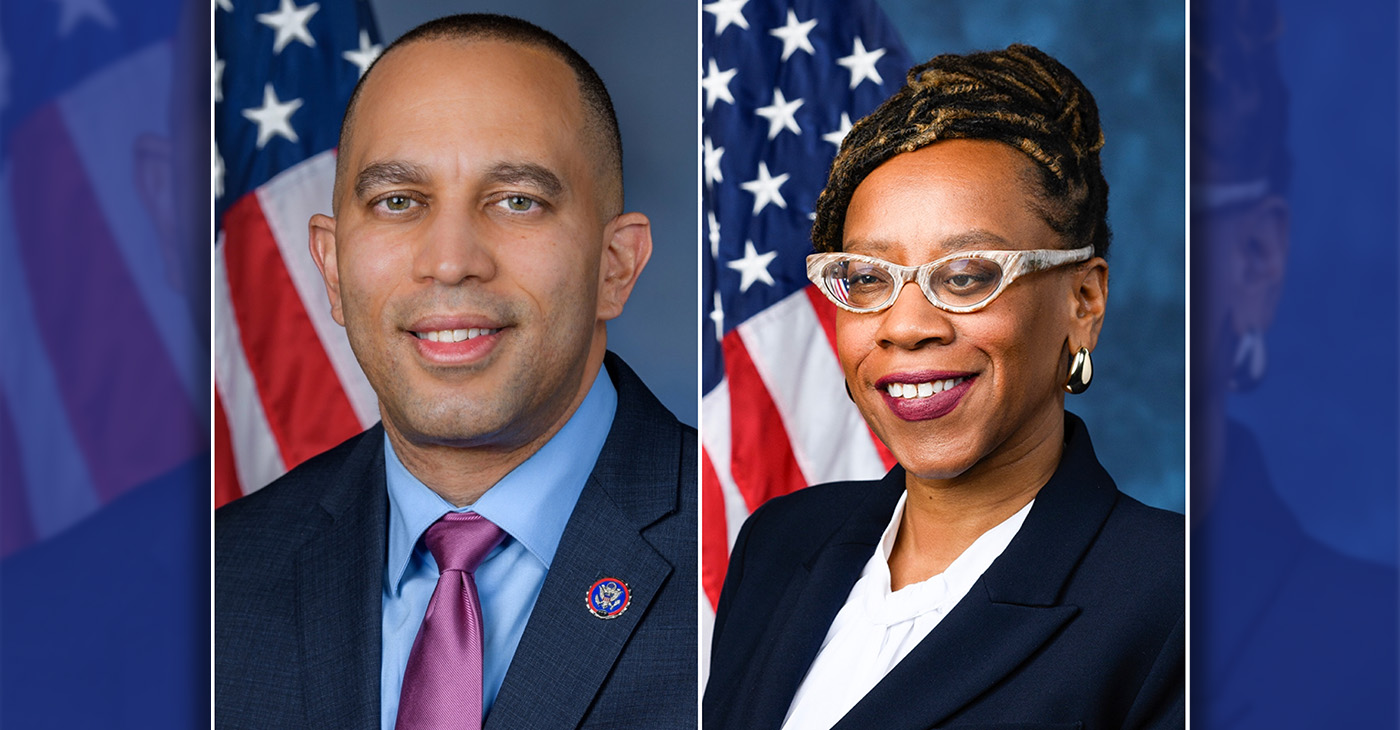
By Scott Horton
United States House of Representatives Minority Leader Hakeem Jeffries (D-NY-8) will be a speaker at the Barbara Lee and Elihu Harris Lecture Series on Friday, Feb. 21.
The event will be held at the Henry J. Kaiser Center for the Arts, 10 Tenth Street in Oakland, at 7 p.m.
The popular lecture series is co-produced by the Oakland-based Martin Luther King Jr. Freedom Center and Peralta Community College District. Jeffries’ appearance marks the 32nd lecture of the Barbara Lee and Elihu Harris Lecture Series, which has provided thousands of individuals with accessible, free, high-quality information.
The overarching goal of the lecture series is to provide speakers from diverse backgrounds a platform to offer their answers to Dr. King’s urgent question, which is also the title of Jeffries’ latest book: “Where do we go from here: Chaos or Community?”
In addition to Jeffries, Congresswoman Lateefah Simon (D-CA-12) will also speak.
“Certainly, now is a time for humanity, in general, and Americans in particular to honestly and genuinely answer Dr. King’s question,” said Dr. Roy D. Wilson, Executive Director of the Martin Luther King Jr. Freedom Center and Executive Producer of the lecture series.
“Dr. King teaches that time is neutral but not static. Like the water in a river, it arrives and then quickly moves on,” continued Wilson. “We must urgently create conditions for listening to many different answers to this vital question, and generate the development of unity of action among all those who struggle for a stronger democracy.”
In his book, Jeffries shares his experience of being unanimously elected by his colleagues as the first African American in history to ever hold the position of House Minority Leader.
In January 2023 in Washington, Jeffries made his first official speech as House Minority Leader. He affirmed Democratic values one letter of the alphabet at a time. His words and how he framed them as the alphabet caught the attention of Americans, and the speech was later turned into a book, The ABCs of Democracy, bringing Congressman Jeffries rousing speech to vivid, colorful life, including illustrations by Shaniya Carrington. The speech and book are inspiring and urgent as a timeless reminder of what it means to be a country with equal opportunities for all. Jeffries paints a road map for a brighter American future and warns of the perils of taking a different path.
Before his colleagues unanimously elected him Minority Leader in 2022, Jeffries previously served as Chair of the House Democratic Caucus and as an Impeachment Manager during the first Senate trial of the 45th President of the United States.
Jeffries was born in Brooklyn Hospital, raised in Crown Heights, grew up in the Cornerstone Baptist Church and he is a product of New York City’s public school system, graduating from Midwood High School. Jefferies went on to Binghamton University (BA), Georgetown University (master’s in public policy) and New York University (JD).
He served in the New York State Assembly from 2007 to 2012.
Admission is free for the Feb. 21 Barbara Lee and Elihu Harris Lecture Series featuring Congressman Jeffries. Please reserve seats by calling the Martin Luther King Jr. Freedom Center at (510) 434-3988.
Signed copies of his book will be available for purchase at the event.
Alameda County
After Years of Working Remotely, Oakland Requires All City Employees to Return to Office by April 7
City Administrator Jestin Johnson recently told city unions that he is ending Oakland’s telecommuting program. The new policy will require employees to come to work at least four days a week. These new regulations go into effect on Feb. 18 for non-union department heads, assistant and deputy directors, managers, and supervisors. All other employees must be back at work by April 7.
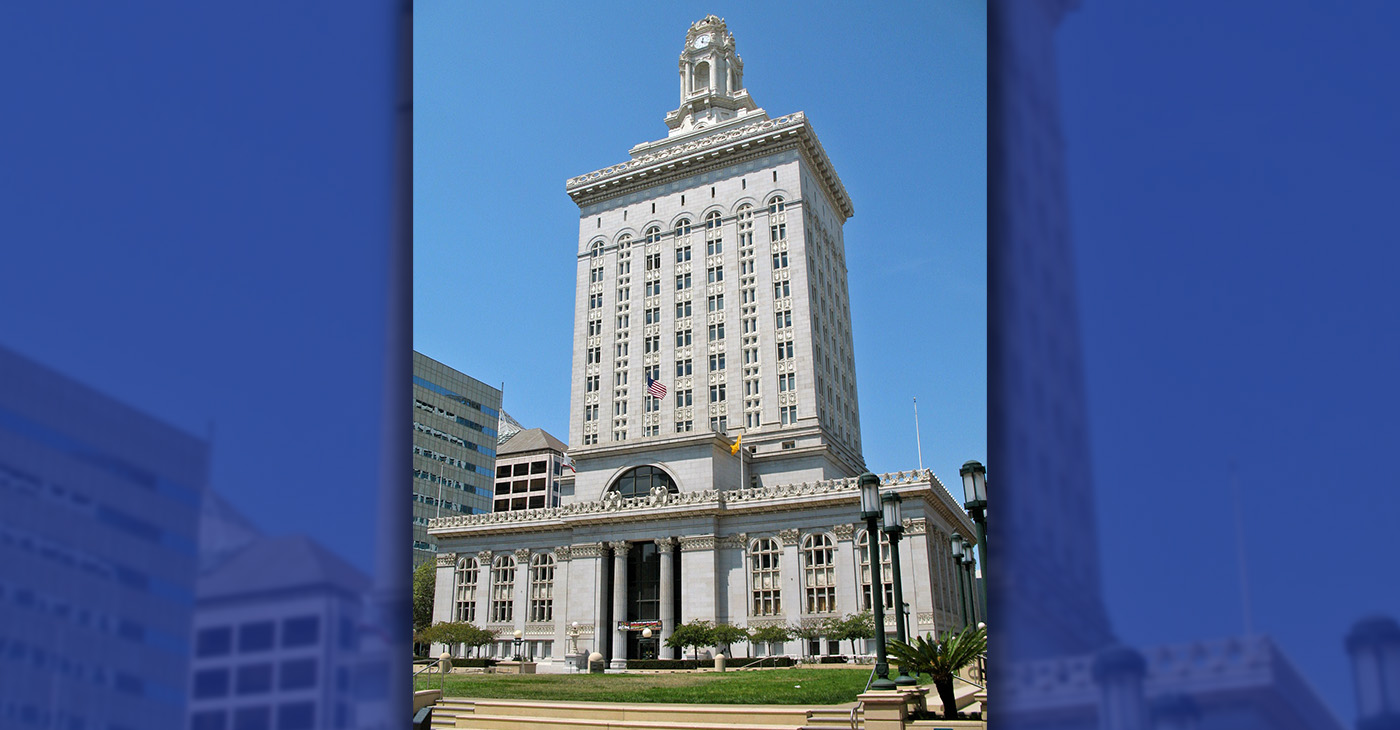
By Post Staff
The City Oakland is requiring all employees to return to the office, thereby ending the telecommuting policy established during the pandemic that has left some City Hall departments understaffed.
City Administrator Jestin Johnson recently told city unions that he is ending Oakland’s telecommuting program. The new policy will require employees to come to work at least four days a week.
These new regulations go into effect on Feb. 18 for non-union department heads, assistant and deputy directors, managers, and supervisors. All other employees must be back at work by April 7.
The administration may still grant the right to work remotely on a case-by-case basis.
In his memo to city unions, Johnson said former President Joe Biden had declared an end to the pandemic in September 2022, and that since then, “We have collectively moved into newer, safer health conditions.”
Johnson said “multiple departments” already have all their staff back in the office or workplace.
The City’s COVID-era policy, enacted in September 2021, was designed to reduce the spread of the debilitating and potentially fatal virus.
Many cities and companies across the country are now ending their pandemic-related remote work policies. Locally, mayoral candidate Loren Taylor in a press conference made the policy a central issue in his campaign for mayor.
City Hall reopened for in-person meetings two years ago, and the city’s decision to end remote work occurred before Taylor’s press conference.
At an endorsement meeting last Saturday of the John George Democratic Club, mayoral candidate Barbara Lee said she agreed that city workers should return to the job.
At the same time, she said, the city should allow employees time to readjust their lives, which were disrupted by the pandemic, and should recognize individual needs, taking care to maintain staff morale.
The John George club endorsed Lee for Mayor and Charlene Wang for City Council representative for District 2. The club also voted to take no position on the sales tax measure that will be on the April 15 ballot.
Activism
Actor, Philanthropist Blair Underwood Visits Bay Area, Kicks Off Literacy Program in ‘New Oakland’ Initiative
These community activations were coordinated with the San Francisco-based non-profit program “Room to Read.” Ray said he is also donating his time to read and take pictures with students to encourage their engagement and to inspire them to read more. The inspirational book “Clifford Ray Saves the Day” highlights Clifford Ray’s true story of saving a dolphin.
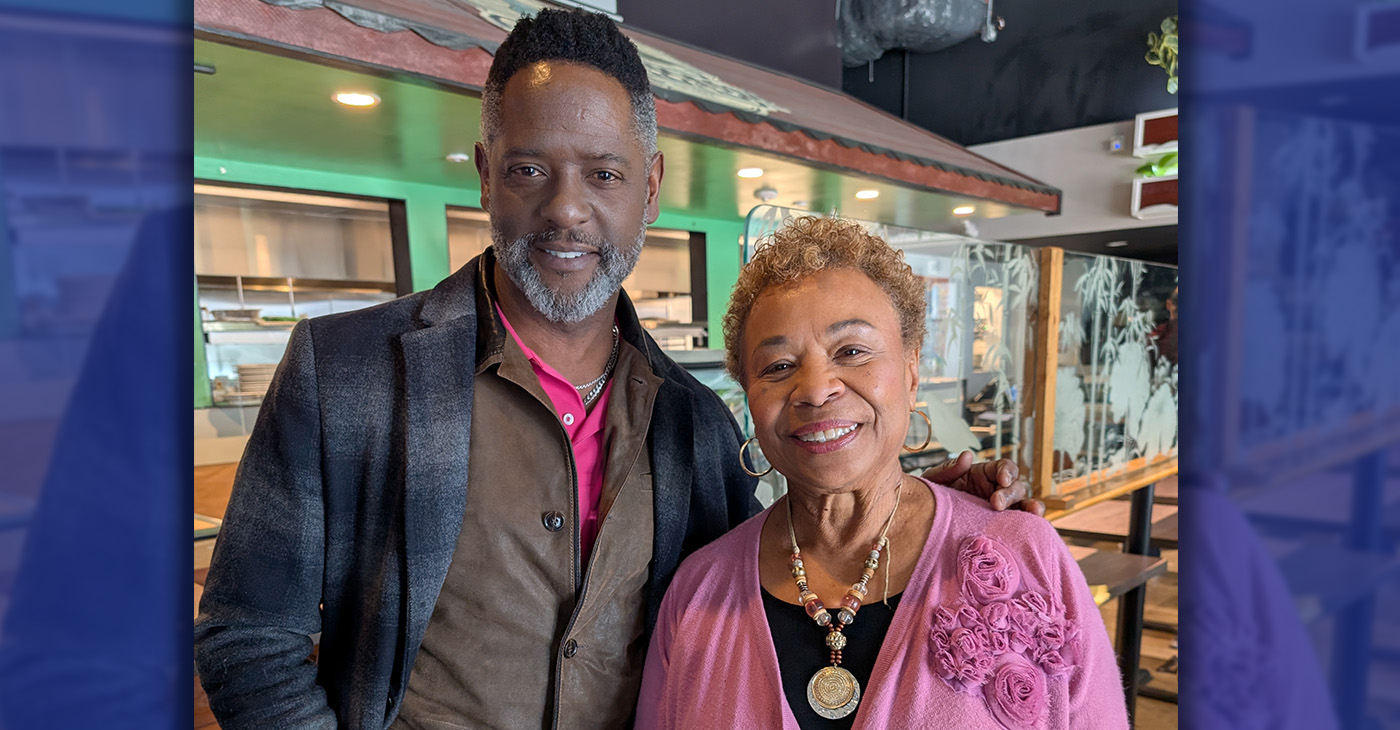
By Paul Cobb
New Oakland Series
Opinion Part 3
The Post mentioned three weeks ago that a number of our local luminaries were coming together to support the “New Oakland” movement. As this current national administration continues to eliminate our “legacy” institutional policies and programs left and right, most communities find themselves beyond “frozen” in fear.
Well, esteemed actor, long-time Bay Area supporter, and philanthropist Blair Underwood returned to Oakland this week to speak with city leaders, community trust agents, students, the Oakland Post, and local celebrities alike to continue his “New Oakland” initiative.
This week, he kicked off his “Guess Who’s Coming to Read” literacy program in some of Oakland’s middle schools. Clifford Ray, who played the center position of the 1975 World Champion Golden State Warriors, donated close to 1,000 books. Ray’s fellow teammate Charles “The Hopper” Dudley also gave Converse sneakers to students.
These community activations were coordinated with the San Francisco-based non-profit program “Room to Read.” Ray said he is also donating his time to read and take pictures with students to encourage their engagement and to inspire them to read more. The inspirational book “Clifford Ray Saves the Day” highlights Clifford Ray’s true story of saving a dolphin.
Underwood also spent quality time with the Oakland Ballers ownership group and visited the amazing Raimondi Park West Oakland community revitalization site. In the 1996 TV film Soul of the Game, Underwood played the role of the legendary first Black Major League Baseball player Jackie Robinson and commended the Ballers owners.
“This group of sports enthusiasts/ philanthropists needs to be applauded for their human capital investment and their financial capital investment,” Underwood said. “Truly putting their money and passion to work,” Underwood said.
Underwood was also inspired by mayoral candidate Barbara Lee’s open-minded invitation to bring public-private partnership opportunities to Oakland.
Underwood said he wants to “reinforce the importance of ‘collaborative activism’ among those most marginalized by non-empathic leadership. We must ‘act out’ our discomfort with passionate intentions to create healthy change.”
-
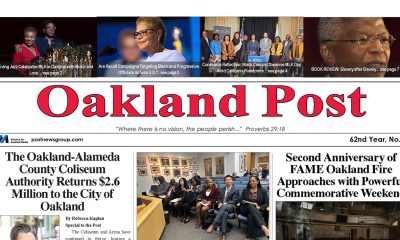
 Activism3 weeks ago
Activism3 weeks agoOakland Post: Week of January 22 – 28, 2025
-

 Activism3 weeks ago
Activism3 weeks agoOakland Poll: Tell Us What You Think About the Cost of Groceries in Oakland
-

 #NNPA BlackPress3 weeks ago
#NNPA BlackPress3 weeks agoPRESS ROOM: Top Climate Organizations React to Trump’s Executive Orders Attacking Health, Environment, Climate and Clean Energy Jobs
-

 #NNPA BlackPress3 weeks ago
#NNPA BlackPress3 weeks agoTrump Exploits Tragedy to Push Racist and Partisan Attacks
-
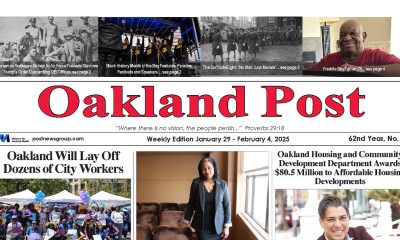
 Activism2 weeks ago
Activism2 weeks agoOakland Post: Week of January 29 – February 4, 2025
-

 #NNPA BlackPress3 weeks ago
#NNPA BlackPress3 weeks agoBlack Reaction to Trump DEI Blame on The Plane Crash
-

 #NNPA BlackPress3 weeks ago
#NNPA BlackPress3 weeks agoBLACK HISTORY MONTH 2025 We Proclaim It
-
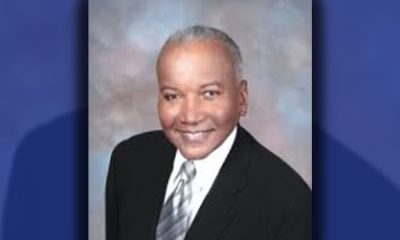
 Activism2 weeks ago
Activism2 weeks agoOP-ED: Like Physicians, U.S. Health Institutions Must ‘First, Do No Harm’










